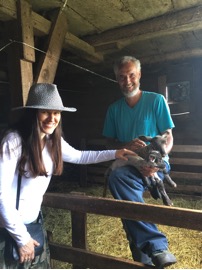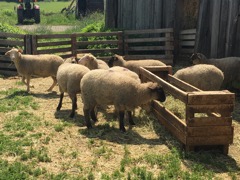Article By
Eddy Basch
Meet Our New Providers of Pasture Raised Kosher Lamb
Meet the newest members of our Tiferet Family of Providers – brothers Andrew and Mike who have been farmers since the 1980’s breeding and raising their pasture raised lamb all year long and not just seasonally as most farmers do.

In the summer months, their lambs graze lush green pastures on their 500 acre farm situated in the Eastern Townships of Quebec – an area, that is perfectly suited to their craft. In fact, these brothers grow all of their own hay and corn necessary to feed their herd of 500 plus sheep. In addition, they carry out all the breeding and other segregating functions necessary to produce this wonderful lamb all within a single self-contained farming operation. The Smith brothers control the entire process from start to finish ensuring the quality of lamb they seek to bring to market.

We were privileged to visit their farm and get a personalized tour of their full operation and learn all the ins and outs of producing pasture raised lamb. We were given a full tour of the nursery, where mother sheep and baby lambs are kept segregated for a full month before being released into the open barns with the other babies and mothers while they are still nursing.
 We were shown how pregnant sheep are kept apart from the other sheep until the birthing of their babies and how flocks are kept apart and grazed separately based on age. Furthermore, every lamb is tagged at birth to keep a strict pedigree for traceability purposes.
We were shown how pregnant sheep are kept apart from the other sheep until the birthing of their babies and how flocks are kept apart and grazed separately based on age. Furthermore, every lamb is tagged at birth to keep a strict pedigree for traceability purposes.
Brothers Andrew and Mike showed us their extensive fields of grass for hay and non GMO corn which serve as food during the winter months. Did you know that a female sheep can breed for ten years plus, and can give birth to one or up to three baby lambs at a time?
Unlike other producers, these lambs are brought to market at 4 to 6 months old which as Andrew explained, is the perfect time to balance size versus taste. Many farmers, in their quest to produce more weight, will wait up to 13 months (which is the limit as to where the lambs still possess their baby teeth) to bring them to market, but as Andrew explained, at that point, the taste is too strong for most people who are looking for lamb, not mutton.


 We were shown how pregnant sheep are kept apart from the other sheep until the birthing of their babies and how flocks are kept apart and grazed separately based on age. Furthermore, every lamb is tagged at birth to keep a strict pedigree for traceability purposes.
We were shown how pregnant sheep are kept apart from the other sheep until the birthing of their babies and how flocks are kept apart and grazed separately based on age. Furthermore, every lamb is tagged at birth to keep a strict pedigree for traceability purposes.


